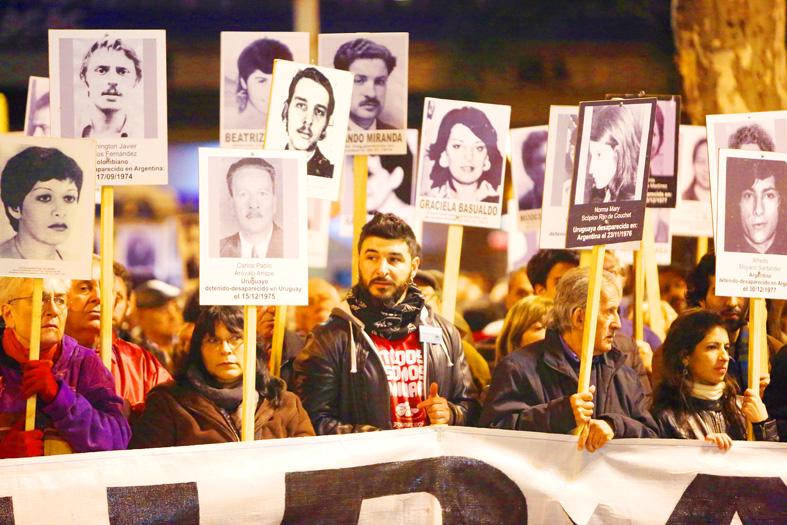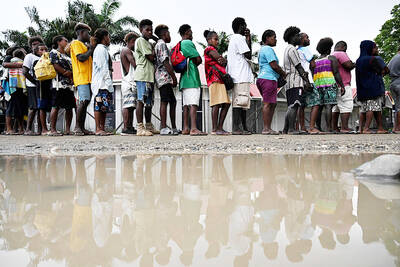When Ana Amoros fell prey to Uruguay’s dictatorship, the first thing her torturers did was strip her naked and hit her with a riding crop. Then they raped her.
Amoros is one of a group of 28 former political prisoners seeking justice for torture and sexual crimes committed by the military regime that ruled Uruguay between 1973 and 1985.
Nine years after first filing a criminal complaint before Uruguay’s courts, the women are to present their case to the Inter-American Commission on Human Rights in March next year.

Photo: EPA-EFE
The women’s quest for justice is made more difficult by a law passed a year after the country’s return to democracy in 1986 that blocked investigation of dictatorship-era crimes.
That allowed some a fresh start, but for others such as Amoros, it meant suppressing the truth about regime-sponsored violence against women.
“Women’s bodies were, and still are, the spoils of war,” said Amoros, now 72.
Considered one of South America’s most progressive countries, Uruguay remains conflicted about its military past.
Torture, killings, enforced disappearances and other serious human rights violations were committed during the nearly 12-year dictatorship.
“Women’s stories are only recently emerging. There is a masculine narrative, a very masculine narrative,” said Luz Menendez, 66, a former political prisoner.
Menendez was arrested and held in La Tablada, an estate outside Montevideo used to torture leftist suspects.
She said her torturer had told her: “Girl, don’t worry, you will leave here alive ... but since you are a communist, you will beg God to let you die, because we are going to drive you to the brink of madness.”
Like other leftist opponents of the regime, Amoros, Menendez, Brenda Sosa, Ivonne Klingler and Anahit Ahoranian were all in their 20s when they were imprisoned and tortured.
Reporters have collected their testimonies since last year.
Amoros was a member of an armed anarchist group, the Popular Revolutionary Organization-Orientales 33. She was arrested on one of the group’s premises she was helping to guard.
She was stripped naked as soon as she arrived at the barracks.
“They hit you with a riding crop that they used to hit horses with, they hit you all over your body. I was blindfolded, but I knew that there were a lot of men,” Amoros said.
She remembers Colonel Gilberto Vazquez.
He gave her a coffee and a cigarette, but when she refused to answer his questions, “he got angry,” said Amoros in a whisper. “That was the first time he raped me.”
“I always thought if that happened, I’d bite him, scratch him. I thought I would kick him in the genitals. I thought I would defend myself, but I did nothing. Nothing,” she said.
Vazquez is under house arrest for dictatorship-era crimes.
Klingler, who was a member of the Communist Party, was arrested after occupying the medical facility where she was a student.
“I never thought I would get to know such a horrifying underworld, where the main goal was to destroy another human being just because you could,” she said.
Sosa was part of a logistics support cell for the Tupamaros, a violent urban guerrilla movement, when she was arrested at the age of 21 at one of the group’s safe houses outside Montevideo.
At the time, the group — to which future Uruguayan president Jose Mujica belonged — “was at its peak, had a good image, like Robin Hood, and I had dreamt of joining it,” said Sosa, now 69.
She was tortured, receiving electric shocks to her nipples and genitals with a device that her captors called a “prod.”
During one session, she was brought face to face with a fellow member of her guerrilla group.
“They brought him in to witness me being tortured. To make him talk,” she said.
Lawyers representing about 100 accused, mostly military, did not respond to requests for an interview.
Many of the women have been unable to speak to their families about their trauma.
Klingler, a retired doctor, said that she could not even begin to explain it: “Can I talk about it? That’s the first question. Can you explain it? Can you name it?”
Ahoranian said that when the dictatorship ended, men took a more pragmatic view and convinced women not to pursue the crimes committed against them.
Their families told them: “That’s it, we’ve lived, we’ve gone through it, let it be, close the chapter,” said Ahoranian, a 71-year-old agronomist.
Amoros, a writer, ruminates on the life she might have led, if not for the scars left by the regime.
“I think about how I was only a young girl. I suffered a lot, it affected me sexually. I had a hard time feeling good about myself,” she said.

SEEKING CHANGE: A hospital worker said she did not vote in previous elections, but ‘now I can see that maybe my vote can change the system and the country’ Voting closed yesterday across the Solomon Islands in the south Pacific nation’s first general election since the government switched diplomatic allegiance from Taiwan to Beijing and struck a secret security pact that has raised fears of the Chinese navy gaining a foothold in the region. The Solomon Islands’ closer relationship with China and a troubled domestic economy weighed on voters’ minds as they cast their ballots. As many as 420,000 registered voters had their say across 50 national seats. For the first time, the national vote also coincided with elections for eight of the 10 local governments. Esther Maeluma cast her vote in the
Nearly half of China’s major cities are suffering “moderate to severe” levels of subsidence, putting millions of people at risk of flooding, especially as sea levels rise, according to a study of nationwide satellite data released yesterday. The authors of the paper, published by the journal Science, found that 45 percent of China’s urban land was sinking faster than 3mm per year, with 16 percent at more than 10mm per year, driven not only by declining water tables, but also the sheer weight of the built environment. With China’s urban population already in excess of 900 million people, “even a small portion

UNSETTLING IMAGES: The scene took place in front of TV crews covering the Trump trial, with a CNN anchor calling it an ‘emotional and unbelievably disturbing moment’ A man who doused himself in an accelerant and set himself on fire outside the courthouse where former US president Donald Trump is on trial has died, police said yesterday. The New York City Police Department (NYPD) said the man was declared dead by staff at an area hospital. The man was in Collect Pond Park at about 1:30pm on Friday when he took out pamphlets espousing conspiracy theories, tossed them around, then doused himself in an accelerant and set himself on fire, officials and witnesses said. A large number of police officers were nearby when it happened. Some officers and bystanders rushed

HYPOCRISY? The Chinese Ministry of Foreign Affairs yesterday asked whether Biden was talking about China or the US when he used the word ‘xenophobic’ US President Joe Biden on Wednesday called for a hike in steel tariffs on China, accusing Beijing of cheating as he spoke at a campaign event in Pennsylvania. Biden accused China of xenophobia, too, in a speech to union members in Pittsburgh. “They’re not competing, they’re cheating. They’re cheating and we’ve seen the damage here in America,” Biden said. Chinese steel companies “don’t need to worry about making a profit because the Chinese government is subsidizing them so heavily,” he said. Biden said he had called for the US Trade Representative to triple the tariff rates for Chinese steel and aluminum if Beijing was